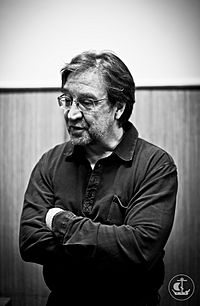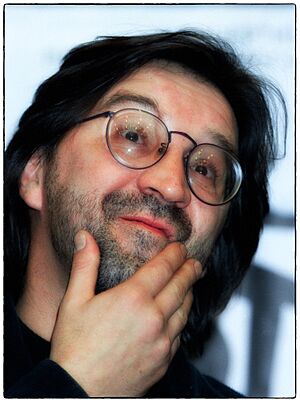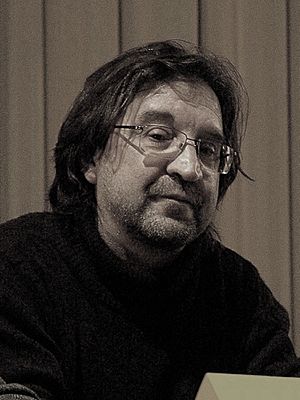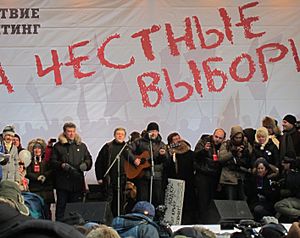Yuri Shevchuk facts for kids
Quick facts for kids
Yuri Shevchuk
|
|
|---|---|

Shevchuk in 2012
|
|
| Background information | |
| Native name |
Юрий Шевчук
|
| Born | 16 May 1957 Yagodnoye, Magadan Oblast, Russian SFSR, Soviet Union |
| Genres | Rock, jazz |
| Instruments | Vocals, guitar |
| Associated acts | DDT |
Yuri Yulianovich Shevchuk (Russian: Юрий Юлианович Шевчук) is a famous Russian rock musician and songwriter. He was born on May 16, 1957. He is best known as the leader of the rock band DDT, which he started in 1980.
People recognize his unique, rough voice. His songs often talk about everyday life in Russia with a clever and kind sense of humor. He is also known for speaking out against pop music that uses playback (where artists pretend to sing). Many consider him one of the best songwriters in Russia today.
Contents
About Yuri Shevchuk
Yuri Shevchuk was born in a place called Yagodnoye and grew up in Ufa, Russia. Before he started the band DDT, he worked as an art teacher. His mother was from the Tatar ethnic group, and his father was Ukrainian.
Early Music and Challenges
As DDT became more popular, Shevchuk faced difficulties from the government. In the Soviet Union, there was strict control over what artists could say or show. In 1985, he decided to move to St. Petersburg with his wife, Elmira. There, he formed a new version of DDT and joined the Leningrad Rock Club. This helped the band reach more people.
DDT started performing internationally. In 1989, they played in Hungary. In 1990, they performed in the United States and Japan for the first time.
Personal Life and Dedication
In 1992, Yuri Shevchuk's wife, Elmira, passed away. He dedicated the album Aktrisa Vesna (Spring the Actress) to her. The album even featured some of her paintings.
Peace and Activism
Yuri Shevchuk is also known for his strong beliefs and actions for peace. In January 1995, during a conflict in Chechnya, he went there on a peace mission. He performed 50 concerts for Russian soldiers, hoping to bring a message of peace.
In 1999, he visited Yugoslavia to support the country during a difficult time. He also criticized the bombings by the US. He helped UNESCO by taking photos of damaged churches in the Kosovo region.
Speaking Out for Freedom
Shevchuk has often spoken out about his concerns regarding democracy and freedom in Russia. He was one of the few famous people to openly discuss these issues with then-Prime Minister Vladimir Putin.
In 2008, he participated in a discussion in St. Petersburg. He talked about how many old buildings and monuments were being torn down in the city. He also emphasized the importance of different opinions in society.
Later in 2008, Shevchuk organized two peace concerts in Moscow and St. Petersburg. These concerts were a protest against a conflict between Russia and Georgia. The concerts were called "Don't Shoot," named after a song he wrote about the Soviet–Afghan War. He performed with artists from Georgia, Ossetia, and Ukraine. The money raised from these concerts helped people affected by the conflict.
In May 2010, Shevchuk had a widely reported conversation with Vladimir Putin on TV. He asked Putin direct questions about democracy, freedom of speech, and freedom of the press. He later said that some of his concerns were looked into by the government.
In August 2010, Shevchuk performed the famous song "Knockin' on Heaven's Door" with the band U2 at their first concert in Russia.
Yuri Shevchuk continued to use his voice for important causes. In 2014, he announced that all money from one of his concerts would go to a fund helping injured people in Donbas.
Since February 2022, Shevchuk has consistently spoken against the conflict in Ukraine. He said that "Our future is being taken from us." He believes that people are being pulled back in time, and they don't want that.
In May 2022, he faced legal issues for speaking out against the conflict. He said that "The motherland... is an impoverished old woman at the train station selling potatoes." He also mentioned that people were being harmed and soldiers were dying because of "Napoleonic plans." He was fined, but he appealed the decision. His appeal was not successful. Because of his statements, a concert celebrating DDT's 40th anniversary was canceled in Moscow.
Shevchuk has recorded two anti-war songs since the conflict began: "Motherland, Come Back Home" and "The Burial of War."
Solo Music (without DDT)
Yuri Shevchuk has also released music on his own, separate from the band DDT. Here are some of his solo works:
| Year | Title (English Translation) | Notes |
|---|---|---|
| 1982 | "Cherepovets magnitalbum" | An early recording. |
| 1995 | "Boiler room" | An underground concert with Alexander Bashlachev. |
| 1998 | "'82" | Music from after 1982. |
| 2001 | "Two concerts. Acoustics" | Acoustic recordings from after 1997. |
| 2005 | "Moscow. Heat" | An underground concert from after 1985. |
| 2008 | "L'Echoppe" | A unique album. |
| 2009 | "Solo" | A collection of his poems. |




